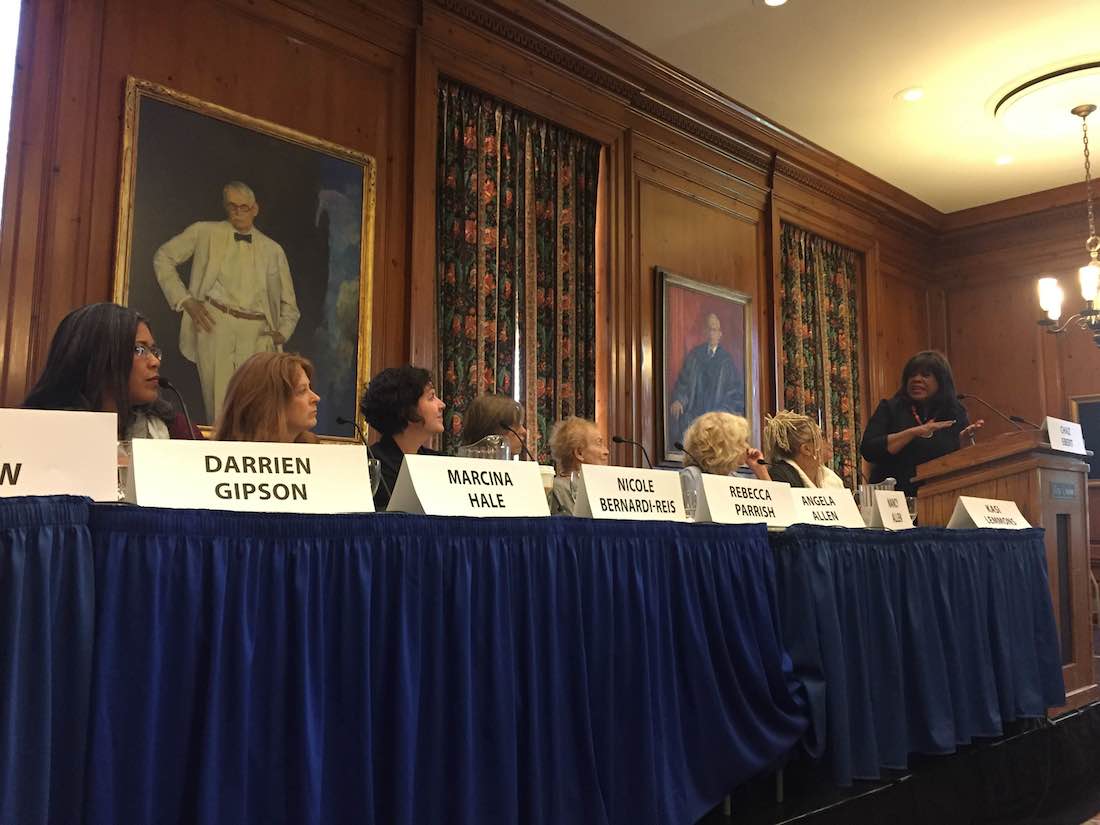Editor’s Note: The following article was written by Ebert Fellow Shalayne Pulia of The Daily Illini.
Darrien Gipson wants to start a Unicorn Mafia. By unicorn, she refers to two central themes of the Roger Ebert Film Festival this year: diversity and female representation in the industry. By mafia, she refers to the camaraderie she feels necessary between women (and men) who understand the vital importance of supporting more women in every level of film. And it is a stratified problem.
Gipson, the National Director of SAGIndie Outreach Program that provides resources for independent filmmakers and actors, spoke on one of two panels held Friday morning in the Pine Room of the student Union on the University of Illinois’ campus.
“How can you make an Oscar worthy film with one tenth of the budget? It’s an uneven playing field to begin with,” Gipson said before moving on to address the amazing disparity between the sheer numbers of women compared to men from the very start of the hierarchical ladder to achievement.
Gipson believes in change from top to bottom starting with the hiring process.
“We have to educate our men to maybe stop looking exactly for themselves and maybe start looking for people with potential and talent.”
But solving, or even making a dent in improving, female representation in the film industry extends the range of hiring managers. It starts with an acceptance of the talent and potential Gipson spoke of on an individual level.
Chaz Ebert, who moderated this “Women in Film” panel, pushed panelist Rebecca Parrish to take ownership of her accomplishments right from the start of the hour-long conversation. She asked a timid Parrish to reintroduce herself with all of her titles including, director, cinematographer, researcher, and more for the film “Radical Grace” screening on Saturday afternoon.
The 11-woman panel, under an ironically foreboding gaze of white male paintings lining the walls of the weathered wooden room, all supported Chaz’s imploring. Energy picked up and fed the rest of the discussion with composed vigor. These are strong women. These are angry women.
“I think the deal is that we are all, as women, generally a little afraid to be angry and how it’s going to come off… And I’ve had people tell me, ‘Oh yeah, everybody’s afraid of you.’ And I’m actually a very easygoing individual,” Gipson said.
Unfortunately in this case, a formidable talent is often bound by the constructs of simply being female and misconstrued as anger or “bitchiness.”
“Eve's Bayou” director Kasi Lemmons spoke of a time when she was called “bitchy” for crossing her arms over her body when considering a film.
The women on this panel offered no one solution to the problem of marginalization in this industry. Instead, they offered multiple perspectives of ways filmmakers, producers, executives, actors, critics and even audience members can make a difference.
It takes the steadfastness of Jana Monji, self-proclaimed “Geisha Warrior” and former sports reporter who refused to ask gold-medalist Kristi Yamaguchi if she had a boyfriend at the request of her editor.
“We do in a sense teach people how to treat us. And we have to make a decision that we’re going to do what we’re going to do,” said Nancy Allen, an actress from the film “Blow Out” screening Saturday night.
This unified resistance against the conscious and unconscious biases and stereotypes stifling female talent in Hollywood warrants membership in Gipson’s Unicorn Mafia. It affects everyone, moviegoer, critic and star alike.
“If there can only be one (woman), we’re afraid of somebody taking my spot … It shouldn’t be one,” said Gipson.
It should be a resounding chorus of female voices, ringing together like they did on today’s panel—equal and aligned. Ignoring the potentially oppressive gaze and pushback from the industry to do what they love.











